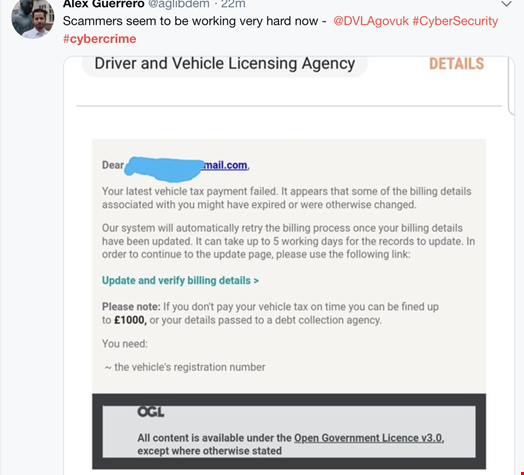Only a few days after the Senate Committee on Aging released a new report in which it found that seniors lose an estimated $2.9 billion each year to financial scams, the insolvency services of Nyman Lisbon Paul and the UK’s Driver and Vehicle Licensing Agency (DVLA) have issued scam alerts warning consumers to beware of cyber scams.
Two weeks ago, Infosecurity reported that 60% of consumers in the UK were leaving themselves vulnerable to scams, and today, Nyman Lisbon Paul tweeted a warning that “pension scam victims lost an average of £91,000 to criminals in 2018, Financial Conduct Authority (FCA) research recently revealed. Criminals often use cold-calls and offers of free pension reviews to convince their victims to comply.”
As scams become more commonplace, government agencies, organizations and concerned citizens are taking to social media to caution consumers about the myriad scams to which they could fall victim. One Twitter user posted:

In an effort to prevent people from falling victim to this and other scams, “DVLA is reminding customers that the only official place to find our services and information is on GOV.UK. Cyber scams are common so we want to help our customers to spot fraudulent activity.”
However, these warnings might be ineffective. According to a recently released report from ERP Maestro that examined the relationship Americans have with cybercrime and identity theft, 76% of Americans believe it is inevitable that they will fall victim to either identity theft or some form of cybercrime. As a result, 48% confess that they are not concerned about becoming a victim. The report found that when it comes to consumer attitudes and behaviors, 57% of Americans believe that if something happens, the damage will be reversed.
In addition, 68% of Americans feel that there is little to nothing they can do to prevent falling victim to cybercrime. Those habits can be potentially dangerous for companies that employ people who don’t take cybersecurity seriously.
"While our mission is to protect companies from cybercrime on the inside, we wanted to examine how concerned people are about cybercrime in their personal life to see if cyber safety is practiced similarly professionally," said Jody Paterson, founder and CEO of ERP Maestro, in a press release.
"Good cybersecurity habits should be practiced at both work and home, but these responses may indicate that the same beliefs and behaviors on cybercrime are also brought into the workplace, and that is a huge risk for companies."
